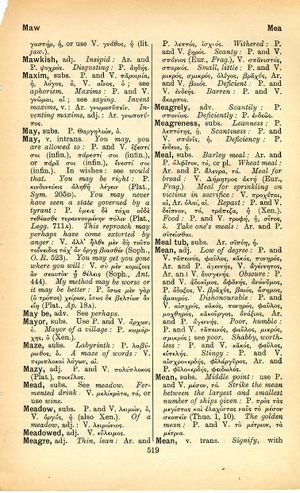mean
English > Greek (Woodhouse)
adjective
low of degree: P. and V. ταπεινός, φαῦλος, κακός, πονηρός, Ar. and P. ἀγεννής, V. ἀγέννητος, Ar. and V. δυσγενής.
obscure: P. and V. ἀδόκιμος. ἀφανής, ἀνώνυμος, P. ἄδοξος. V. βραχύς, βαιός, ἄσημος, ἀμαυρός.
dishonourable: P. and V. αἰσχρός, κακός, πονηρός, φαῦλος, μοχθηρός, κακοῦργος, ἀνάξιος, Ar. and P. ἀγεννής.
poor, humble: P. and V. ταπεινός, φαῦλος, μικρός, σμικρός; see poor.
shabby, worthless: P. and V. κακός, φαῦλος, εὐτελής.
stingy: P. and V. αἰσχροκερδής, φιλάργυρος, Ar. and P. φιλοκερδής, φειδωλός.
substantive
middle point: use P. and V. μέσον, τό.
strike the mean between the largest also smallest number of ships given: P. πρὸς τὰς μεγίστας καὶ ἐλαχίστας ναῦς τὸ μέσον σκοπεῖν (Thuc. 1, 10).
the golden mean: P. and V. τὸ μέτριον, τὰ μέτρια.
verb transitive
signify, with personal subject: P. and V. λέγω, λέγειν, φράζειν, εἰπεῖν, V. ἐννέπειν, Ar. and P. διανοεῖσθαι; with non-personal subject: Ar. and P. νοεῖν, δύναμαι, δύνασθαι, P. βούλεσθαι, σημαίνειν, φρονεῖν (Thuc. 5, 85), V. θέλειν (Eur., Hippolytus 865 and Supplices 1055).
Absol. with infin., intend: P. and V. βουλεύειν, νοεῖν, ἐννοεῖν, Ar. and P. διανοεῖσθαι, ἐπινοεῖν.
be about to: P. and V. μέλλειν.
mean to do (a thing): Ar. and V. δρασείειν (τι), V. ἐργασείειν (τι).
to whom their survival also success meant most: P. ᾧ ἐκείνους σωθῆναι καὶ κατορθῶσαι μάλιστα διέφερεν (Dem. 321).

